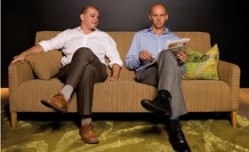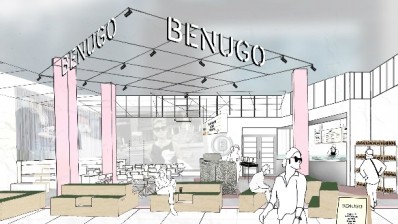Business profile: Benugo

The name Benugo, a compression of the Christian names of its founders, Ben and Hugo Warner, sounds like one of those fantastical creatures from Greek mythology — a griffin or a centaur, perhaps — comprising elements of two different animals. And Benugo is, indeed, an unusual beast, a hybrid that defies simple categorisation. One half is a chain of (very good) sandwich bars, while the other consists of a number of bespoke restaurants operated in public (and corporate) spaces.
The restaurant division is currently on a roll, with The Riverfront Bar & Kitchen having just opened at the British Film Institute on London’s South Bank, the launch of Serpentine Bar & Kitchen in Hyde Park later this spring, and a contract in place to run the restaurant in Oxford’s famous Ashmolean museum when it reopens late this year.
With tough trading conditions on the high street, it’s no surprise that the company’s current focus is on the public-spaces division. “The public-space arena is much more secure,” agrees Ben. “You’ve got to do a very good job, but you have a sitting audience to some extent who are going to come, regardless.”
That may be true, but it doesn’t begin to explain the brothers’ success. As Hugo suggests, taking over a public space means you can easily measure whether your concept and offering is more or less popular than what came before you. Previous operators had the same “sitting audience”, but Benugo has a habit of outperforming them all.
“It’s lovely to be able to take somewhere over and just do so much better,” says Ben. “We took over a tiny little cafe in the Museum of London recently. It doesn’t break any records because it’s very small, but to be doing three times what the previous people were doing is a remarkable achievement.”
That success is built on operational effectiveness — and much of that was learned in the early days, when they opened their first sandwich bar, in Clerkenwell, in 1998. While Ben had worked as a chef and had run three Pret franchises, and while Hugo had worked in restaurants and wine, nothing could have prepared the brothers for launching their own concept. It was an innovative idea at the time — a made-to-order sandwich bar — and they got a lot of press when it opened. But despite its popularity, it took a long time to make any money. Before it did so, the brothers had to streamline their operation and increase their efficiencies.
“We started using recipe cards, costing out our ingredients,” Hugo recalls. “You learn to be more effective. We redesigned all the counters to be more ergonomic, to take less labour to set them up and close them down. It’s all the little costs, and you just keep chipping away at them. But you mustn’t ever reduce the quality of the product — that’s service as much as the ingredients. And with ingredients, we said, we’ve got to have quality. But what we want to do is waste less.”
Pitching to win
This attention to detail — along with an understanding that consumers wanted choice —served them well as they moved into running larger concepts. The company’s Public Spaces and Restaurants division had its origins in 2005, when the brothers pitched for and won a contract to run the caf™ in the Victoria & Albert museum in London. Hugo confesses he is still amazed they were successful in their bid. “We were just a sandwich shop,” he says. “We thought it would be a laugh, going into the boardroom and giving a presentation. We won and I remember saying to Ian Blatchford, the client, when he phoned up — I said, are you sure you’ve got the right number?”
Opening in the V&A involved a steep learning curve, but the lessons they had learned running sandwich bars helped them make the V&A a huge success. “When we took it over, a low week was about £17,000 and now a low week for us would be £45,000,” confirms Hugo. “That would be a really bad week,” adds Ben. “This year has been exceptional at the V&A,” says Hugo.
At the Natural History museum (another recent contract they won), sales are already 40 per cent up. “That’s pure operations,” explains Hugo. “That’s putting in a better product, one that’s made freshly on site and consistently throughout the day, so it’s always available. When we arrived, there was a range of five sandwiches, made in batches, made one day at a time; so, feasibly, your sandwich could have been five days old. In practice, you usually had a choice of just one or two. With our production system we have a range of 32 sandwiches and they’re always available. They’re made in little batches, frequently, all day long.”
According to Hugo, the mistake some operators make is to rationalise the range so they can cope with huge volume: “That’s a fatal error. The more choice you can give, the better, particularly when you’ve got a massively diverse customer base. You offer that and, lo and behold, your sales go up.”
As for the sandwich bars, the Benugo Cafe Deli brand remains a key part of the brothers’ plans, and a merger with contract caterer Baxter Storey in 1997 has given them greater financial clout and further ability to expand. The most recent Benugo opened in St Pancras station and “has gone very well”, but, as everyone in the industry will know, the time isn’t quite right for major high-street expansion. “Like most people we’re sitting here thinking the rents are going to come down,” says Hugo.
“It’s never been our ambition to have a Benugo on every street corner anyway,” adds Ben. “It’s more of a community brand. It’s our ambition to have fantastic Benugo stores in chosen locations.”
New locations won’t be abroad, even though, bizarrely, they have five Benugo caf™s in Japan — franchises run by an elder brother who lives there. And they won’t be looking to franchise further. “We like to control things too much to franchise,” says Hugo.
So for now it’s full steam ahead with the public-space projects. And as the brothers sit back and take stock of the 25-site company they’ve built, they can hardly contain their excitement. “We’ve grown up with sandwiches and coffees and suddenly we’re playing with the big boys,” says Hugo. “It’s enormous fun.”
Business profile: Martin Kuczmarski of Soho House Group
Business profile: Clapham House Group
Business profile: Leon
Business profile: Robin Rowland of Yo! Sushi





















